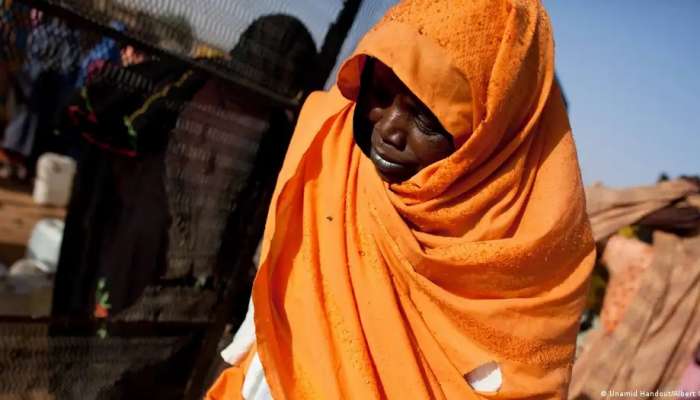
Darfur: "Massacre." "Carnage." "Bloodshed." United Nations observers and human rights organizations have said they fear the worst in the event the ongoing siege by Sudan's Rapid Support Forces on El Fasher — the last stronghold of the opposing Sudanese Armed Forces in Darfur — culminates in an attack.
Since the outbreak of the war in Sudan in April 2023, El Fasher has turned into Darfur's largest humanitarian hub. Today, it's home to around 1.5 million people, including 800,000 internally displaced persons.
An informal peace deal between the warring parties — the Sudanese Armed Forces, or SAF, under General Abdel Fattah Burhan, and his rival, the head of the Rapid Support Forces, or RSF, General Mohammed Hamdan Dagalo — has so far granted relative safety for the city's growing population.
This situation, however, changed last month when two armed groups in El Fasher, the Sudan Liberation Army and the Justice and Equality Movement, announced plans to side with the Sudanese Armed Forces.
"These two groups not only have their own local networks, but they see the Rapid Support Forces as a shared enemy, which is a very potent driver to unite them," Hager Ali, a researcher at the German think tank GIGA Institute for Global and Area Studies, told DW.
In turn, the RSF stepped up its military efforts to ensure these new alliances neither get too strong, nor that they could strike military counter campaigns, she added.
"El Fasher now hosts the largest population in the cities of Darfur, including camps for internally displaced people and over 50 shelter centers within the city," said Michelle D'Arcy, Sudan country director of the Norwegian People's Aid organization.
Yet, the current tensions around El Fasher have prevented the entry of humanitarian aid, she confirmed.
Toby Harward, the UN's deputy humanitarian coordinator for Sudan, said earlier this month that the humanitarian situation in and around El Fasher is catastrophic.
"There has been a significant deterioration in the security situation, including increasing arbitrary killings, theft of livestock, systematic burning of entire villages in rural areas, escalating air bombardments of parts of the city and a tightening siege around El Fasher, which has halted humanitarian aid convoys and choked off commercial trade," he said in a report on May 2.
A recent analysis by Yale University's Humanitarian Research Lab also confirmed that 23 communities in North Darfur have been burned in apparent arson attacks since mid-April.
And according to the UN World Food Program, "time is running out to prevent starvation in the vast region."
US Ambassador to the United Nations Linda Thomas-Greenfield told reporters in late April she fears "history is repeating itself in Darfur in the worst possible way," adding that El Fasher was "on the precipice of a large-scale massacre."
After the outbreak of war in April 2023, the fighting between the SAF and RSF quickly extended from Sudan's capital, Khartoum, to Darfur — where a part of the population identifies as Arab and others as African — and where the RSF is based.
According to Human Rights Watch, the paramilitary Rapid Support Forces and their allied militias then constituted a campaign of ethnic cleansing against Darfur's non-Arab population.
On May 9, the watchdog released a report on the killing of the Masalit ethnic minority
in Darfur in 2023, where UN experts assume around 15,000 people were killed in Geneina, the capital of West Darfur, and more than half a million people were displaced.
Also this week, the Sudanese Archive, an open-source platform that collects digital information related to human rights violations, published footage showing the abuse of civilians, including women and children, by the Rapid Support Forces in Geneina in November 2023.
It remains to be seen whether the RSF will launch a full-scale attack to take control of El Fasher and, thus, one-third of the nation's territory, including Sudan's international borders with Libya, Chad and the Central African Republic.
However, achieving a victory in El Fasher would come at a high price, observers agree.
"An all-out battle for control of the city causing massive civilian bloodshed would lead to revenge attacks across the five Darfur states and beyond Darfur's borders," said Harward of the UN.
This view was echoed by Constantin Grund, head of the Khartoum office of the German Friedrich Ebert Foundation.
"An attack would provoke more local armed groups to join the fighting, with disastrous consequences for the civil population," he told DW.
Furthermore, the RSF would lose their political popularity and standing, he added.
"It would accelerate the decline in local support as well as it would cancel the RSF's enormous efforts to give themselves the appearance of legitimacy in one fell swoop," he added.
Meanwhile, international calls for a cease-fire and the reopening of humanitarian aid corridors remain unheard by both sides.
On May 2, the Saudi foreign minister made phone calls to both generals and urged them to "stop the fighting for the protection of state institutions and the nation of Sudan."
"This might change, however, if international pressure increased, Hager Ali believes. "The RSF currently perceive themselves to be completely impervious to any real consequences," she told DW, adding that they have nothing to fear regarding international prosecution or accountability."